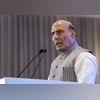Defence Minister Rajnath Singh called upon private defence firms on Friday to move forward from “participation” in defence production to “taking the lead.” He assured private companies of the government’s full support in making India an innovation and technology hub, and one of the strongest countries in the world.
He was addressing scientists, industry leaders, academia, start-ups, micro, small and medium enterprises (MSMEs), and young entrepreneurs during Twaral, a workshop featuring the Defence Research and Development Organisation (DRDO) and industry on “defence technology acceleration” in New Delhi.
Highlighting the DRDO’s efforts to promote a scientific temperament, Rajnath pointed out that the defence ministry’s Technology Development Fund (TDF) scheme is providing up to 90 per cent of a project’s cost as grant support to eligible industries.
“The total support is up to Rs 50 crore, a good amount for any MSME or start-up to invest in defence R&D. Since its launch six years ago, 79 projects have been sanctioned, of which, technology has successfully been developed in 18 projects,” he said.
As part of the event, the defence minister launched “Dare to Dream 5.0” to encourage the next generation of innovators to develop transformative ideas for defence applications.
Rajnath felicitated the winners of “Dare to Dream 4.0,” in which innovators came up with disruptive solutions in the fields of countermeasures for drones; advanced acoustic systems to locate gunfire; directed energy technologies; cognitive listening devices; target-seeking and proximity sensing; free-space laser communication systems; and multi-terrain, multi-utility robots, among others.
Deep-Tech Challenges
More From This Section
Several challenges on Disruptive, Emerging, Enabling, and Pioneering Technologies (Deep-Tech) were also launched to drive major advancements in areas critical to the country’s defence infrastructure.
The challenges included: compact electromechanical actuators; indigenous thrusters for naval yard craft; development of high-purity silicon carbide source powder for the bulk growth of silicon carbide single crystals; and development of a digital twin framework for aero gas turbine engine health and usage monitoring.
Technology to end-users
Several cutting-edge indigenous technologies developed under the TDF scheme were handed over to users, including DRDO and the armed forces.
These included autonomous drones as first responders for search and report missions, developed by NewSpace Research and Technology for the Centre for Artificial Intelligence and Robotics (CAIR), DRDO.
CAIR also received a simulator for unmanned ground, marine, and aerial vehicles from private firm Combat Robotics India Ltd. In addition, CAIR received a data assessment active learning and believability system for visual data.
Chistats Labs Pvt Ltd developed an Aero Gas Turbine Engine Health Monitoring System for the Gas Turbine Research Establishment (GTRE), DRDO.
Valdel Advanced Technologies designed watertight/gas-tight and fire regulation-compliant doors and hatches for naval warships. In addition, Tejas Aeroscience developed a fuel system temperature transducer for aircraft applications for the Aeronautics Development Agency.
)